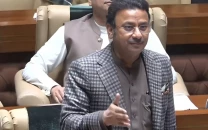Filing tax returns a requisite for army promotions
Govt non-committal about establishing Directorate General of Immovable Property

File photo of Pakistan Army soldiers. PHOTO: REUTERS
“The military is very much concerned about the tax base of the country and Gen Bajwa has already filed his income tax return last month,” said the FBR Member Facilitation and Taxpayers Education (FATE) Hamid Ateeq Sarwar. Sarwar along with two other senior FBR members spoke to the media a day after the government exempted the salaried class from paying penalties on late filing of the returns.
“Being non-filer could now affect promotions in the army,” said Sarwar while responding to a question about the tax contributions by the Pakistan Army. The comments have been made at a time when the tax authorities face a gigantic task of broadening the extremely narrow tax base.
Only two days are left in the close of the last deadline for filing the income tax returns. However, only 900,000 people and companies have submitted their returns. Last year, around 1.4 million taxpayers filed returns.
Broadening of the tax base and catching tax thieves are among the main goals of the Pakistan Tehreek-e-Insaf (PTI) government. In the past, the military has also publically expressed concerns over the low tax collection in the country, although it falls in the civilian jurisdiction.
The official said before reduction in individual income tax rates, the army alone was paying nearly Rs398 million per month in income tax on the salaries, bringing its annual contribution to Rs4.8 billion. He said the military and its welfare organisations are also deducting withholding taxes on various transactions.
“Topi Rukh marriage hall Rawalpindi –owned by the military – is the single largest contributor of withholding taxes being collected on arranging functions”, said Sarwar.
During July-September quarter of this fiscal year, the FBR’s Regional Tax Office Rawalpindi collected Rs27.8 million withholding taxes from all the marriage halls located in its jurisdiction. The collection was 15% of the total withholding taxes collected on functions and gatherings.
Immovable property
The PTI government remains non-committal to implement a key reform introduced by the Pakistan Muslim League-Nawaz (PML-N) government during its last weeks in office. The FBR’s Member Tax Policy Dr Mohammad Iqbal on Wednesday did not give a clear commitment to establish the Directorate General of Immovable Property despite the fact that it is an obligation under the income tax law.
“Unless provinces are taken on board and they change their tax laws and property tax rates, the new system will be difficult to implement,” said Dr Iqbal while responding to a question.
The former prime minister Shahid Khaqan Abbasi had taken a courageous step and introduced the concept of pre-emption right through the Finance Act 2018 that came into effect from July 1.
As an incentive, Abbasi had also lowered the tax rates on purchase and sale of properties, ranging from 1% to 4%, to only 1% of the gross value of the property. Both these measures were planned to come into force at once.
But the FBR has not yet notified establishment of the Directorate General of Immovable Properties that could have given authorities the first right to acquire assets that were undervalued to evade taxes. It has also not increased the property valuation rates in big cities as an alternate to the DG Immovable Properties.
The preemption scheme entitles the government to purchase any asset – residential or commercial – at 100% higher price than the one declared by the owner at the time of registration. The move is meant to control under-declaration of asset values at the time of registration.
At present, there are three rates of one property. One is the actual price, the second is deputy collector (DC) rates of the provinces, and the third is the FBR valuation rates that are higher than the DC rates but lower than market rates.
The buyers use undeclared assets to pay the difference between the actual market and the FBR valuation rates. The new scheme eliminates this difference as it allows property holders to declare it at actual price and pay only 1% tax.
But the delay in issuance of notifications is resulting in payment of federal taxes at the existing rates of 1% and 2% being charged from the sellers and 2% and 4% being paid by the purchaser.
From July through September, the FBR collected Rs1.1 billion withholding tax from the sellers –up by 10.4%. The collection from the property purchasers stood at Rs508 million –down by 45% during the first quarter.



















COMMENTS
Comments are moderated and generally will be posted if they are on-topic and not abusive.
For more information, please see our Comments FAQ